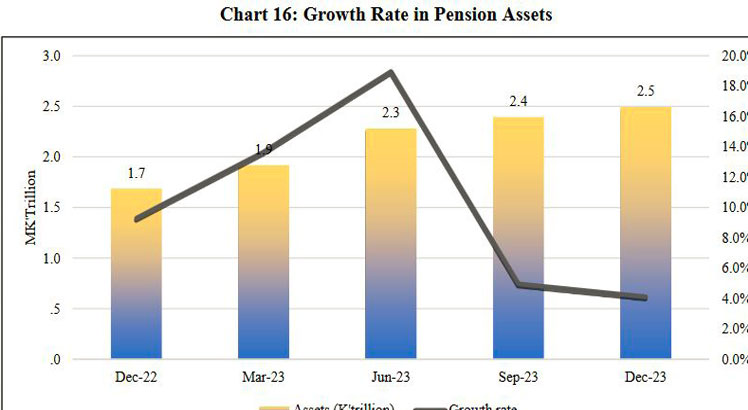Kwacha devaluation erodes k2.5tn pensions
The Reserve Bank of Malawi (RBM) says the weakening of the kwacha coupled with high inflation rate is eroding the value of K2.5 trillion the pension fund.
The latest RBM Financial Stability Report, which analysed the financial sector performance between July and December 2023, says
although the pensions sub-sector grew by eight percent to K2.5 trillion during the period, kwacha devaluation, high inflation and non-remittances are among key risks.

Reads the report in part: “Inflation and currency risk posed a significant threat to the pension sector. The value of member savings has been eroded by the increase in inflation.
“Furthermore, the realignment of the local currency in November 2023
exacerbated the situation by further diminishing the real value of pension funds.”
This is in spite of the funds growing to K2.5 trillion by December 2023 where annual contributions grew by117.6 percent to K203.3 billion from K93.4 billion in June 2023 and investment income increased by 31 percent to K776.3 billion from K589 billion in June 2023.
On the other hand, the report also notes that investment income performed well because of positive performance of the Malawi Stock Exchange, where most pension funds are invested.
“The high concentration of assets in listed equities and government securities posed a risk to the pension sector,” reads the report.
In an interview on Monday, Malawi Congress of Trade Unions (MCTU) president Charles Kumchenga called on authorities to act in the interest of pensioners on both the weakening value of the funds and the non-remittance issues.
He said when it comes to non-compliance, MCTU encourages the regulator to use legal means to force employers that are failing to settle contributions to do so.
Employers Consultative Association of Malawi executive director George Khaki said companies faced severe economic challenges in 2023 with production levels going down, as such, most employers hardly manage their statutory obligations.
“Last year, businesses struggled with post-Covid-19 challenges, Cyclone Freddy effects, foreign exchange scarcity and fuel shortages that affected production as most manufacturers could not access enough raw materials for production,” he said.
Meanwhile, RBM says the registrar plans to utilise powers under the Pension Act of 2023 to impose stringent penalties for defaulting employers.
Meanwhile, the RBM report has said pension contribution arrears stand at K35 billion as of December 2023.





